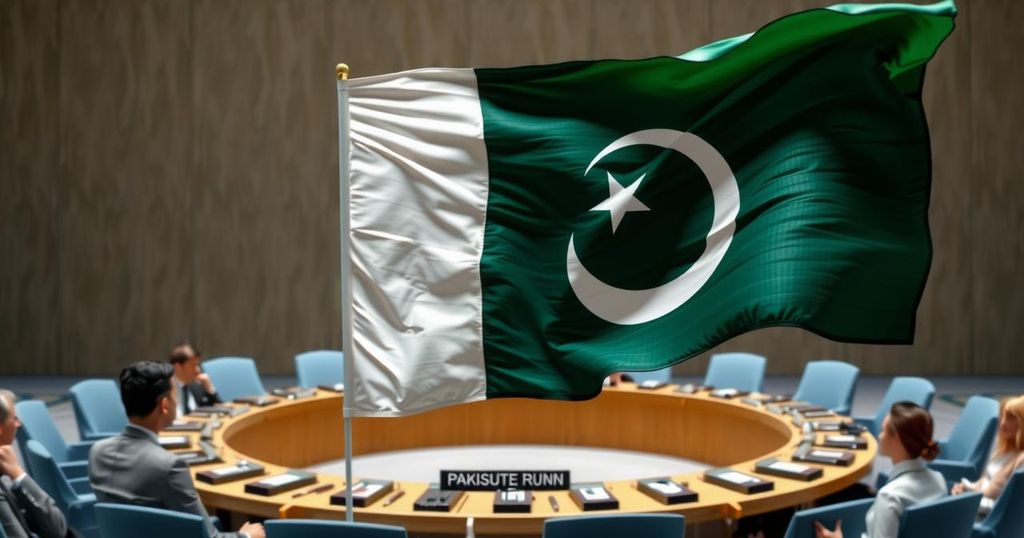Pakistan has inaugurated its eighth term as a non-permanent member of the United Nations Security Council, with its flag installed in the UNSC chamber. The country replaces Japan and will preside over the Council in July 2025-2026, allowing it to influence key discussions on global peace and security. Ambassador Asim Iftikhar Ahmad reaffirmed Pakistan’s commitment to the UN Charter and its role as a voice for oppressed peoples, emphasizing the need for cooperative multilateralism to address current challenges effectively.
On Thursday, the Pakistani national flag was installed at the United Nations Security Council (UNSC) chamber, marking the commencement of Pakistan’s eighth term as a non-permanent member for the period of 2025-2026. Following its election in June, Pakistan has taken its place, replacing Japan, and occupies one of the vital Asia-Pacific seats on the UNSC. This term provides Pakistan significant opportunities to influence discussions on critical international matters and to preside over the Council in July, enabling it to shape the agenda and foster constructive dialogue.
At the installation ceremony for the flags of the five newly elected non-permanent members, which included Pakistan, Denmark, Greece, Panama, and Somalia, Pakistan’s Alternate Permanent Representative, Ambassador Asim Iftikhar Ahmad, played a central role in the proceedings. The new members replace Japan, Ecuador, Malta, Mozambique, and Switzerland, whose terms concluded on December 31, 2024. The UNSC consists of 15 members, with the five permanent members being Britain, China, France, Russia, and the United States, and 10 non-permanent members allocated by geographic region, with five rotating each year.
With its position on the Council, Pakistan gains the opportunity to serve on the Islamic State and Al Qaeda Sanctions Committee, which oversees the designation of individuals and groups as terrorists and the imposition of sanctions. The UNSC, regarded as the most powerful entity within the United Nations system, is crucial for maintaining international peace and security, as it has the authority to issue binding resolutions and authorize the use of force against states.
During the ceremony, Ambassador Ahmad emphasized Pakistan’s commitment to upholding the principles enshrined in the UN Charter, aimed at maintaining global peace and fostering friendly relations among nations based on equal rights and self-determination. He expressed a strong advocacy for the rights of oppressed populations under foreign occupation, reiterating Pakistan’s intention to remain a robust voice for their pursuit of self-determination. He stated, “Pakistan will always remain a strong voice for peoples under foreign occupation and oppression and the realization of their right to self-determination.”
Ambassador Ahmad elaborated on the necessity for cooperative multilateralism, with the UN at its core, as an effective strategy for resolving contemporary challenges. He called for addressing the root causes of longstanding and new conflicts, emphasizing the importance of dialogue, diplomacy, and confidence-building measures. The Ambassador articulated Pakistan’s readiness to partner with fellow UNSC members to seek just and peaceful solutions on the Council’s agenda, advocating for a comprehensive approach to peace initiatives ranging from conflict prevention to lasting peace-building measures.
Lastly, he reaffirmed Pakistan’s commitment to international law and the effective implementation of UNSC resolutions, emphasizing the nation’s responsibilities towards those affected by conflicts. Ambassador Ahmad underscored, “Never forgetting our solemn duty towards the millions of men, women, and children suffering in conflicts, Pakistan is assuming this responsibility, fully resolved to our collective endeavor for a more peaceful and secure world.”
Pakistan has a long-standing history of serving on the United Nations Security Council (UNSC) as a non-permanent member, which allows it to influence international diplomatic discussions on significant global issues. The UNSC, composed of 15 members, includes five permanent members with veto power and ten non-permanent members whose terms rotate. This structure provides a platform for nations to contribute to peacekeeping, sanctions, and discussion on international security matters. Pakistan’s election as a non-permanent member signifies its role in the Asia-Pacific region and the global stage as a contributor to multilateral efforts.
The installation of the Pakistani flag at the UNSC marks a significant milestone as the country enters its eighth term as a non-permanent member, highlighting its role in influencing international dialogue on pressing global issues. Ambassador Ahmad’s remarks underscore Pakistan’s commitment to uphold the UN Charter and its principled approach to addressing the rights of those under foreign occupation, supporting multilateralism, and seeking peace through collaborative efforts. This term presents both opportunities and challenges for Pakistan as it navigates its responsibilities within the Council.
Original Source: www.dawn.com






